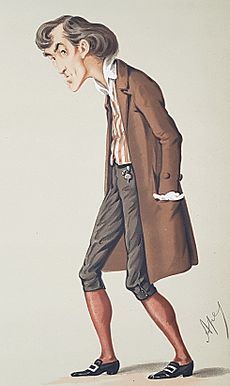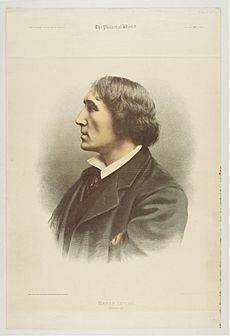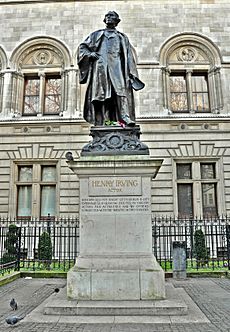Henry Irving facts for kids
Quick facts for kids
Henry Irving
|
|
|---|---|
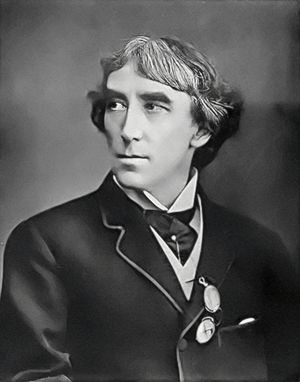
Sir Henry Irving
|
|
| Born |
John Brodribb
6 February 1838 Keinton Mandeville, Somerset, England
|
| Died | 13 October 1905 (aged 67) Bradford, West Riding of Yorkshire, England
|
| Resting place | Westminster Abbey |
| Other names | J. H. Irving |
| Occupation | Actor |
| Years active | 1856–1905 |
| Spouse(s) | Florence O’Callaghan |
| Children | Harry Brodribb Irving Laurence Irving |
| Signature | |
 |
|
Sir Henry Irving (born John Henry Brodribb; 6 February 1838 – 13 October 1905) was a famous English stage actor during the Victorian era. He was known as an actor-manager, meaning he was in charge of everything for his plays at the Lyceum Theatre in London's West End. This included choosing actors, directing, and even designing sets and lighting.
Irving helped make English classical theatre very popular. In 1895, he became the first actor ever to be made a knight, which showed that acting was finally seen as a respected profession in British society.
Contents
Becoming a Star: Henry Irving's Early Life
Henry Irving was born into a working-class family in Keinton Mandeville, England. As a child, he lived with his aunt in Cornwall. He loved performing and even competed in a poetry contest at a local church.
When he was 13, he started working in a law office. But after seeing a play with a famous actor, he decided he wanted to be on stage. He began taking acting lessons and got his first job at the Lyceum Theatre in Sunderland in 1856. For many years, he worked hard, taking on more than 500 different roles in various theatre groups across Scotland and northern England.
His big break came in 1871 when he starred in the play The Bells in London. This performance made him a huge success and set him apart from other actors of his time.
Family Life and Close Friends
Irving married Florence O'Callaghan in 1869. However, his acting career was always his top priority. Their marriage ended early, and they lived separately, though they never officially divorced. Irving had two sons: Harry Brodribb Irving and Laurence Irving. Harry became a famous actor and theatre manager, just like his father. Laurence became a writer.
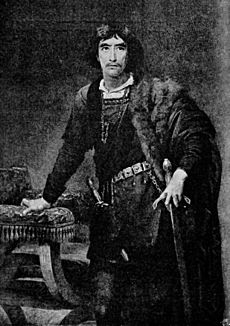
One of Irving's most important professional relationships was with the actress Ellen Terry. She became his leading lady at the Lyceum Theatre. They performed many famous roles together, like Ophelia to his Hamlet and Lady Macbeth to his Macbeth. Their partnership was incredibly successful and lasted for many years.
Irving also had a close friend and manager named Bram Stoker, who later wrote the famous novel Dracula. Stoker admired Irving greatly and even used him as an inspiration for the character of Dracula.
Leading the Lyceum Theatre
In 1878, Henry Irving took over the management of the Lyceum Theatre. This was a huge step, as it meant he was now in complete control of the theatre's productions. He and Ellen Terry brought many classic plays to life, including Hamlet and The Merchant of Venice. Irving's portrayal of Shylock in The Merchant of Venice was especially famous because he played the character with dignity, which was different from how others had played him before.
Under Irving's leadership, the Lyceum Theatre became a very important place for English theatre. They put on many popular plays like Much Ado about Nothing, Twelfth Night, and Faust. They also performed plays by famous writers like Alfred, Lord Tennyson and William Shakespeare.
During these busy years, Irving and his theatre company also traveled to the United States and Canada several times, performing for audiences there.
Making Theatres Safer
After a terrible fire at the Exeter Theatre Royal in 1887, which killed many people, Irving became very concerned about theatre safety. He was one of the first to donate money to help the victims.
He then worked with a famous architect to create new rules for "Irving Safety Theatres." These rules included making sure theatres were separate buildings, had clear exits for everyone, and used fire-resistant materials. The first theatre built with these new safety rules was the rebuilt New Theatre Royal in Exeter.
Later Years and Legacy
Irving continued to perform and manage the Lyceum Theatre for many more years. He starred in new plays and revived old favorites. In 1898, he gave special lectures at the University of Cambridge.
Sir Henry Irving died on 13 October 1905, at the age of 67, after a performance in Bradford. He was cremated, and his ashes were buried in Westminster Abbey. He was the first person ever to be cremated before being buried there.
Irving left a lasting mark on theatre. He helped raise the status of actors and made theatre a respected art form. He received honorary degrees from several universities, showing how much his work was valued. There is a statue of him in London, and his influence can still be seen in books, plays, and musicals today.
Biography
In 1906, Bram Stoker wrote a two-volume book about his friend, Henry Irving, called Personal Reminiscences of Henry Irving.
See also
 In Spanish: Henry Irving para niños
In Spanish: Henry Irving para niños
- Irving Family


